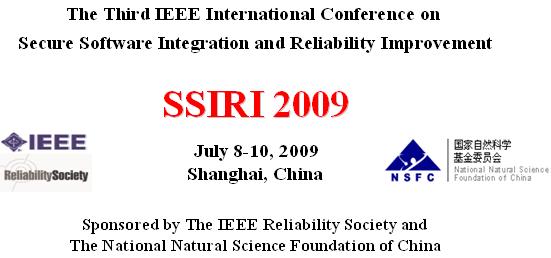|
SSIRI 2009 is a forum for the exchange of methods, theories and ideas related to the development of reliable, secure, and trustworthy software systems. Researchers and practitioners will present innovative theories and methods and discuss on-going ideas, experiences and best-of-breed practices for ensuring the security and reliability of software systems in a more effective and efficient way. SSIRI 2009 not only allows the academic community to gain an increased awareness of the areas that are vital to the software industry, but it also grants practitioners an opportunity to express their needs. The conference has three major tracks: research paper, fast abstract and student doctoral program.
Topics of interest include, but are not limited to:
| |
Security, reliability, availability, and safety of software systems
|
| |
Fault tolerance, survivability and resilience of software systems
|
| |
Modeling, prediction, simulation and evaluation
|
| |
Validation, verification and testing
|
| |
Metrics, measurements and analysis
|
| |
Architecture, design and system integration
|
| |
Methods and theories
|
| |
Automation and tools
|
| |
Industry best practices
|
| |
Benchmark and empirical studies
|
| Regular Papers |
| |
March 8, 2009: |
Deadline for abstract submission |
| |
March 8, 2009: |
Deadline for paper submission |
| |
April 22, 2009: |
Notification to authors |
| |
May 29, 2009 (extended): |
Deadline for camera-ready versions |
|
| Fast Abstract |
| |
April 20, 2009:
|
Deadline for submission |
| |
May 7, 2009:
|
Notification to authors |
| |
May 29, 2009 (extended): |
Deadline for camera-ready versions |
|
| Student Doctoral Program |
| |
April 15, 2009:
|
Deadline for submission |
| |
May 7, 2009:
|
Notification to authors |
| |
May 29, 2009 (extended): |
Deadline for camera-ready versions |
|
INFORMATION FOR
AUTHORS OF
REGULAR
PAPERS |
Submit original papers (not published or submitted elsewhere)
with a maximum of ten pages. Include the title of the paper,
the name and affiliation of each author, a 150-word abstract,
and up to 8 keywords. The format of your submission must follow
the IEEE conference proceedings format.
The authors of a number of selected papers of special merit will
be invited to submit an extended version of their papers for
possible publication in a special journal issue.
|
INFORMATION FOR
AUTHORS OF
FAST
ABSTRACTS
|
The objective of fast abstracts is
to report on-going work, describe practical experiences, introduce new
ideas to promote further validation, or state positions on controversial
issues. Each fast abstract can have a maximum of two pages using the IEEE conference proceedings format.
|
INFORMATION FOR
AUTHORS OF
STUDENT
DOCTORAL
PROGRAM
|
The objective of the Student Doctoral Program is to encourage students to attend SSIRI and present their work, exchange ideas with researchers and practitioners, and get early feedback on their research efforts. Submit original papers (not published or submitted elsewhere) with a maximum of six pages using the IEEE conference proceedings format. Each submission should include the title of the paper, the name and affiliation of each author, a 150-word abstract, and up to 8 keywords. The first author must be a student (the advisor or non-student collaborators may be co-authors). Once accepted the paper should be presented by a student.
|
INFORMATION FOR
PANEL
ORGANIZERS
|
Panel sessions will be held in parallel with paper sessions and
tutorials. A panel proposal should include organizer's contact
information, the title, a 150-word scope statement, and a list of
panelists with their affiliations.
Send you your proposal to Professor Eric Wong
General co-Chairs
Program co-Chairs
| Amit Paradkar |
Rajesh Subramanyan |
Fei Xie |
| IBM Watson Research, USA |
Siemens Corporate Research, USA |
Portland State University, USA |
Local co-Chairs
Tutorial Chair
| Sam Keene |
| IEEE Reliability Society |
|

